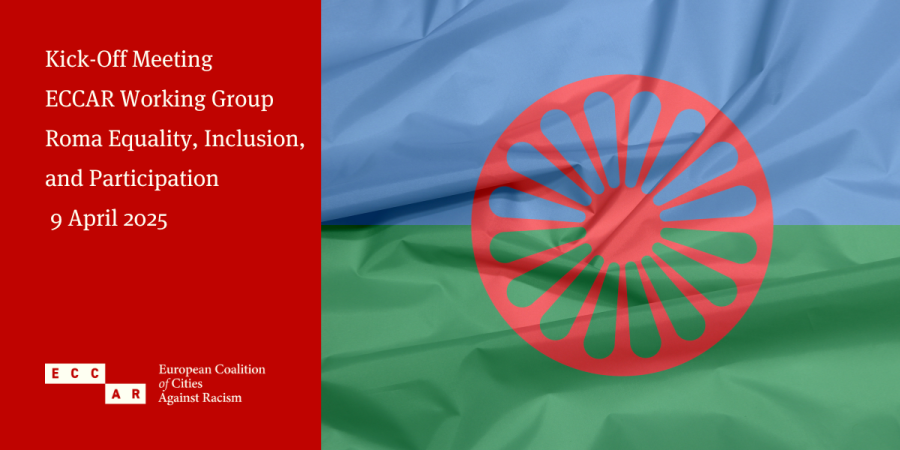
The European Coalition of Cities Against Racism (ECCAR) officially launched its new Working Group on Roma Equality, Inclusion, and Participation on 9 April 2025. The kick-off meeting, held virtually, brought together representatives from over 18 European cities, as well as key partners from EU institutions and civil society organisations.
Opening the Dialogue
Dr Linda Hyökki, Senior Policy and Advocacy Advisor at ECCAR and coordinator of the working group, moderated the meeting. Danijel Cubelic, ECCAR Vice President and Head of the Office of Equal Opportunities of the City of Heidelberg, emphasised in his opening remarks the International Roma Day (8 April) and the working group's mission to raise awareness about the diversity of Roma communities and the persistent discrimination they face across Europe. The new Working Group aims to identify local needs and develop tailored strategies to foster the inclusion of Roma.
European Commission’s Commitment
Irena Moozova, the European Commission's Deputy Director-General for the International Dimension of Justice Policies, Rule of Law, and Equality, delivered the official greeting. Moozova reaffirmed the Commission’s support for the initiative, underlining the importance of addressing segregation in education, healthcare, housing, and combating poverty. She highlighted the 2020 EU Roma Strategic Framework as a guiding instrument. Importantly, she also reassured cities that help is available, citing funding opportunities like the EAFRD and European Social Fund+ as ready to support local initiatives. Dr Linda Hyökki thanked the European Commission for its financial support of the working group, which was provided through ECCAR’s framework grant for 2022-2025.
Understanding the Landscape
Jaroslav Kling, Project Officer, Equality, Roma and Social Rights Unit at the European Union Agency for Fundamental Rights (FRA), shared recent findings on Roma and Traveller communities. In response to a participant’s question, Kling clarified that the survey only covered EU member states but recommended contacting Istanbul’s international hub for information on non-EU countries, such as Türkiye.
Localising the EU Roma Strategy
Isabela Mihalache, Senior Policy Officer of the European Roma Grassroots Organisations Network (ERGO), stressed the vital role of local governments in realising Roma inclusion goals. She shared how ERGO builds bridges between local governments and grassroots organisations, helping to bring the EU’s grand strategies to life in communities. Drawing on lessons from the previous EU Roma framework (2011–2020), Mihalache emphasised the need for stronger cooperation between municipalities and civil society. She also offered ERGO’s resources and support to the cities involved.
Mapping of Current Local Work, Needs, and Challenges
In an interactive mapping session on the challenges and needs of the participating cities regarding local work on Roma equality, inclusion, and participation, the cities mentioned challenges in housing and illegal settlements, structural racism, lack of resources for long-lasting projects and outcomes, exclusion of Roma from the national policies, and discrimination in employment. At the same time, the Roma communities do not trust the public authorities and the city administration, which leads to a lack of dialogue and cooperation. The cities expressed their need for more networking opportunities with Roma-led NGOS and strategies to reach out to the communities, access to data and research, as well as regular exchange of good practices with other cities.
Funding Opportunities for Cities
Miguel Hernandez Littlewood, Policy Assistant at the European Commission’s DG REGIO, presented funding avenues available to municipalities. He informed participants that calls for the European Urban Initiative are ongoing, while innovative actions have annual thematic calls. For Cohesion Policy funding, he recommended contacting the regional Managing Authorities.
Good Practice: Local Action ReFIT in Mannheim
Claus Preissler and Isa Kuck presented ECCAR member city Mannheim’s local efforts through the ReFIT project. The initiative provides local governments with a set of resources in regions where the social integration of newly arrived Roma presents greater challenges. Various tools from the ReFIT toolbox are applied based on the specific requirements of the individual municipalities and organisations. Preissler also discussed the challenge of missing ethnic data in public records, which complicates the provision of targeted support. Kuck, representing the Baden-Württemberg branch of the German Sinti and Roma Association, elaborated on their educational and anti-discrimination initiatives, highlighting both the successes and resistance encountered during school-based trainings.
Next Steps
In wrapping up the meeting, Dr Linda Hyökki encouraged participants to stay connected through ECCAR’s communication channels. She reminded cities that the working group’s next meeting is scheduled for later this year. ECCAR looks forward to continuing this vital work alongside its member cities, European partners, and Roma organisations to build a more inclusive and equitable Europe.
The minutes of the meeting, along with the annexes, are available here.
